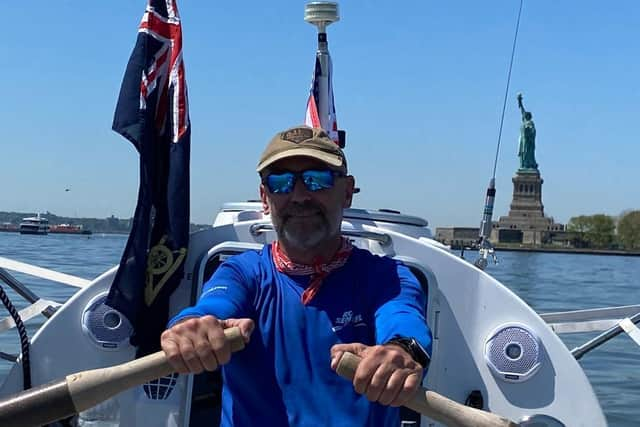Former SAS soldier calls on Leeds Beckett experts to help prepare him to cross the Atlantic ocean in a rowing boat
and live on Freeview channel 276
Ian Rivers, 55, approached the university after it supported the British Army’s attempt to summit Mount Everest via the West Ridge in 2006.
Mr Rivers will be rowing for between nine and twelve hours each day and estimates that the crossing will take him around 95 days. He set off on last week from New York and has been given expert advice from academics from the Carnegie School of Sport and the School of Clinical and Applied Sciences on various aspects of the challenge such as psychology, nutrition, physiotherapy and strength and conditioning.
Advertisement
Hide AdAdvertisement
Hide AdProf John O’Hara from the Carnegie School of Sport explained the process the experts from each area followed.


He said: "We started by assessing his overall condition and establishing if there were any injury risks, particularly to his lower back and shoulders. We then looked at his musculoskeletal function, specifically related to rowing to make sure he had a good range of movement, function and strength. We then assessed his rowing specific endurance capabilities to understand how much training would be needed to get him to where he needs to be to be able to undertake the challenge.
“We measured his body composition using our dual-energy X-ray absorptiometry which takes precision measures of fat and lean mass. We needed to make sure that as Ian increased his training, he wasn’t losing muscle mass and especially needed to make sure he is going to be in peak condition to take on the amount of rowing that will be needed and that he has enough muscle mass to keep him going.
A typical day’s food intake will try to hit 5,500 calories and includes three ration packs with meals including granola with raspberry, beef stroganoff and spaghetti carbonara, flavoured energy drinks and coffee, sweet treats, savoury snacks such as nuts and biscuits and protein gel supplements.
Advertisement
Hide AdAdvertisement
Hide AdLeeds Beckett will also by monitoring Mr Rivers during his challenge and gathering data about his heart rate and recovery, food intake, sleep patterns, physical and mental state and the balance between both factors.
Whilst in the army, Mr Rivers fought in theatres of war across the world and was a member of 22 Special Air Service Regiment for more than a decade. In December 2012, whilst working for an American news network, he was kidnapped in Syria. He escaped his captors and managed to find his way to safety using only natural indicators.
He said: “I’d describe myself as an adventurer. I’ve always been drawn to the ocean, ever since I was a kid. I’ve wanted to attempt this challenge since I was in my 20s.
“I’m looking forward to the calmness, the equilibrium of being alone for a long time. If I’m honest I don’t like my own company so it’s the ultimate challenge for me to be on my own for that long.”
Ian is raising money for two charities during the challenge - the SAS Regimental Association’s Sentinels programme and St Michael’s Hospice in Herefordshire.
